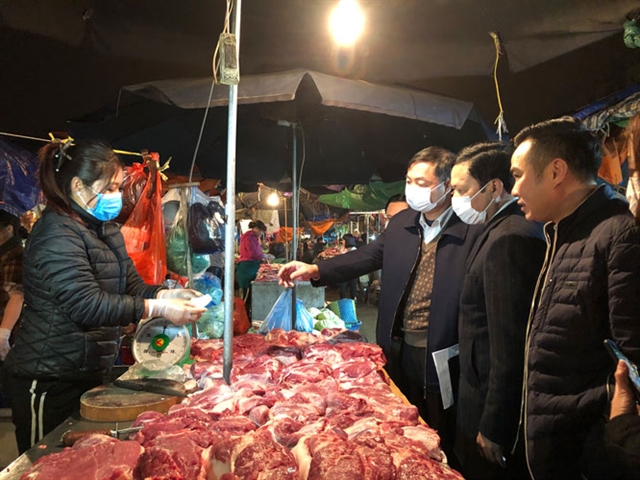.jpg) Society
Society
.jpg)

|
| Food inspectors check the quality of pork in a wholesale market in Hoàng Mai District. —Photo hanoimoi.com.vn |
HÀ NỘI — Hundreds of food inspectors often start their work when Ha Noi sleeps, working to ensure food safety and hygiene for consumers.
Phạm Văn Tuấn regularly wakes up at midnight to inspect slaughterhouses and wholesale markets in Hà Nội’s Thanh Oai District.
The inspections start at 1am and finish at about 6am every day.
Tuấn, head of the district’s Livestock and Animal Health Office, said managing slaughterhouses was not easy because not all owners of slaughterhouses complied with regulations on animal’s origins.
Some slaughterhouses failed to show the origin of their animals and others didn't co-operate with inspectors when they were found running abattoirs without licences, he added.
Nguyễn Văn Phán, another employee of the office, said he and his colleagues were used to working day and night.
“We have to do our job at any time after we receive reports of ill or dead animals,” he said.
They had to identify the cause of the illness or death and report to the office for a prompt response, he said.
“We have a few days off each year,” he added, Hà Nội Mới (New Hà Nội) online newspaper reported.
Phán only had one day off during the 2020 Tết (Lunar New Year) holidays, he said.
Nguyễn Ngọc Sơn, head of the city’s Livestock and Animal Health Division, said food inspectors had to work at full capacity to check the quality of food before holidays like Tết, due to the increased amount of animals being transported from nearby provinces to Hà Nội.
The job forced the inspectors to directly contact animals, including ill animals, leading to a very high risk of contracting diseases, he said.
In Bắc Từ Liêm District, Trần Hoàng Bách, a worker of the Hà Nội Agro-Forestry-Fisheries Quality Assurance Division said currently, the amount of farm produce from provinces and cities transported to Hà Nội daily was very large.
However, not all of it had a clear origin, he said.
Inspectors had to check the quality of vegetables and fruit from midnight before traders sell the products in the early morning every day to ensure only safe and hygiene farm produce was sold, he said.
Strict but soft
Lieutenant Phạm Văn Tường, a police officer of Natural Resources and Environment Office under Hà Nội’s Police Department said the office aimed to strictly handle violations but still create conditions for traders to do business.
Lê Trung Kiên, head of the Inspector Office under the agro-forestry-fisheries quality assurance division, said there were many small traders and it was difficult to control the origin of farm produce and livestock.
He said he and his colleagues were still determined to inspect and handle all violations to ensure only safe and clear-origin foods were sold.
"However, strict but soft," he added.
If inspectors found a slaughterhouse being operated without a business licence, they would help them prepare documents to get a licence, he said.
If inspectors found a small trader failed to comply with regulations, the first thing they would do is explain why they had to follow regulations, and punishment would come later, he said.
Tạ Văn Tường, deputy head of the city’s Agricultural and Rural Development Department, said to ensure agricultural and aquatic products were not contaminated with microorganisms or banned chemicals, the department had conducted a lot of inspections, both planned and random.
Statistics from the department reveal 174 individuals were fined nearly VNĐ1.4 billion (US$60,200) for selling farm produce, poultry and animal without clear origin last year, with the number of violations about 10 per cent lower than in 2018. — VNS
.jpg)



